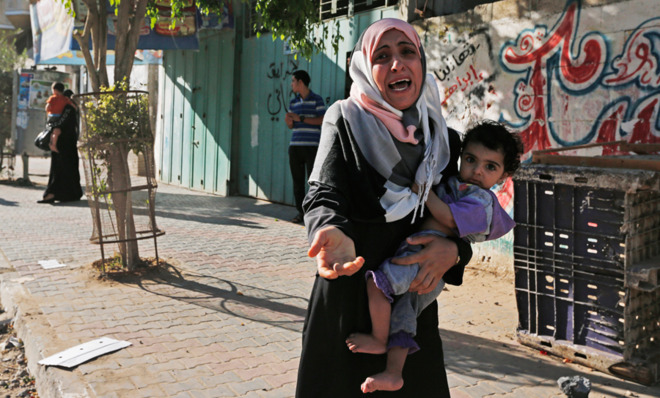Israel has the right to defend itself. What about the Palestinians?
Israel enjoys all the rights to military force that come with statehood. But what of those who have been denied a state?


Early in Israel's latest round of hostilities with Hamas, Israeli Prime Minister Benjamin Netanyahu released a statement: "No country in the world [would] agree to suffer relentless missile attacks and infiltration attempts." His words have since been repeated frequently, usually in support (qualified or un-) of Israel's operation in Gaza.
There is an inarguable truth here: No country would sit idly by under such circumstances. Every state, and every citizen in those states, has a universally recognized right to self-defense.
But what — the question is almost never posed — of the stateless?
The Week
Escape your echo chamber. Get the facts behind the news, plus analysis from multiple perspectives.

Sign up for The Week's Free Newsletters
From our morning news briefing to a weekly Good News Newsletter, get the best of The Week delivered directly to your inbox.
From our morning news briefing to a weekly Good News Newsletter, get the best of The Week delivered directly to your inbox.
The Palestinian people are routinely expected to suffer precisely what Netanyahu describes as insufferable. They're routinely expected to tolerate relentless attacks and infiltrations, and do nothing.
Let me be very clear: Hamas is not a defensive force. In its resistance to occupation, Hamas has used terrorism and rocket attacks on civilians; both tactics are not only despicable, but they're also war crimes. When Hamas engages the Israeli military, it could be argued that such engagement is, at least, legitimate (armed force against armed force), but Hamas was not conceived as nor does it constitute a defensive force.
Furthermore, Hamas' activities are often the very instigation that draws air attacks and cross-border incursions. Hamas isn't to blame for the nearly 2,000 Palestinian deaths in the latest paroxysm of violence — because surely the military that does the shelling is to blame when its munitions kill — but neither is Hamas entirely blameless. When you consciously provoke attack, you do so knowing people will die. As Max Fisher recently put it, "Both sides independently bear responsibility for the degree to which their tactics lead to civilian deaths."
But let's leave Hamas to the side. Let's leave all Palestinian movements to the side, down to and including the Palestine Liberation Organization, which, while largely considered "moderate" now, was once considered the worst of the worst.
A free daily email with the biggest news stories of the day – and the best features from TheWeek.com
Let's look only at today's reality for Gazans, the vast majority of whom aren't combatants. (Even if we get carried away and declare voting patterns sufficient reason to deem civilians demi-combatants, let's recall that most Gazans weren't old enough to vote in 2006, the last time elections were held.) That's nearly 1.7 million people who were nowhere safe for nearly a month, and hundreds of thousands who lost or were run out of their homes. They're still trying to eat, sleep, and find family members without a regular supply of electricity or water. They were killed in their hundreds and injured in their thousands, by a foreign military raining bombs from the sky and marching across their border.
Do they have a right to self-defense?
Let's posit a circumstance in which wealthy Palestinians fund, train, and arm a small defensive force intended only to respond to Israeli assault. Israeli armed personnel carriers cross Gaza's border — Gazan Defense Forces respond with rocket-propelled grenades. The IDF bombs commercial centers — the GDF has surface-to-air missiles. Would that be okay? Would Israel and the U.S. accept that?
We know the answer. We can already hear the cries that "the Palestinians" can't be trusted to "only respond." And that anyway, Israel wasn't assaulting! This was self-defense!
Sometime in recent-ish history, humans came to a general agreement that only state agents may legitimately wield violence. I can't holster up and pat down suspects, but my local police can; my friends and I can't declare war on our adversaries, but the U.S. government can. This is why the whole concept of "war crimes" exists: We've agreed that war is legitimate under certain circumstances, but we've also agreed that some kinds of violence remain beyond the pale.
Israel is a nation-state. It has a military, and not just any military, but the region's mightiest, armed with M16s and F-16s and the U.S.-funded Iron Dome.
The Palestinian people, on the other hand, have no infantry, no air force, no air defense — and no state. They don't have the former, because they don't have the latter.
Many respond instinctively to Palestinian statelessness in one of two ways (or both): "The Arabs rejected partition (i.e., the establishment of a Palestinian state alongside a Jewish state) in 1948!" or "There's no partner for peace on the Palestinian side!"
The first is undeniably true: Two nationalist movements went to war in 1948, and each hoped it would win. Only one did.
But the year is currently 2014. There's a lot of water under the bridge, and since its 1967 occupation of the West Bank and Gaza, Israel has consistently stood in the way of a Palestinian state. Its Palestinian interlocutors have been neither angelic nor perfect, but Palestinian Authority President Mahmoud Abbas began advocating for a two-state peace in 1977, and even Israel's current ambassador to the U.S. has admitted that former PA Prime Minister Salam Fayyad "was a peace partner."
Standing in the way of a Palestinian state was official Israeli policy until the 1993 Oslo Accords; it long remained the platform of the right-wing Likud party, now the lead member of the government coalition headed by Netanyahu. Even though Netanyahu once made a speech indicating a changed mind, Likud party faithful rejected the shift. And in the meantime, he's made it clear, in word and deed, that he never really had any such intention.
So the Palestinian people have no access to internationally sanctioned violence. This doesn't excuse terrorism or war crimes by Hamas or anyone else. It's simply a fact: The Palestinian people have no access to internationally sanctioned violence. No RPGs, no ground-to-air missiles, not even an Iron Dome.
Which in practice means it has no access to self-defense.
I'm Israeli. I lived in Tel Aviv and worked in Jerusalem during the worst of Hamas' suicide bombing campaigns; I have loved ones who had to shelter from Hamas rockets these past several weeks and in the past. That Israel has a right to self-defense is not a thing I question.
What I question is the Israeli government's methods, used over and over, so far unsuccessfully, and at enormous cost to both its own people and the Palestinians.
And I wonder if the world will ever get around to asking if maybe Palestinians have a right to self-defense, too.
Emily L. Hauser is a long-time commentary writer. Her work has appeared in a variety of outlets, including The Daily Beast, Haaretz, The Forward, Chicago Tribune, and The Dallas Morning News, where she has looked at a wide range of topics, from helmet laws to forgetfulness to the Israeli-Palestinian conflict.
-
 Can Mike Johnson keep his job?
Can Mike Johnson keep his job?Today's Big Question GOP women come after the House leader
-
 A postapocalyptic trip to Sin City, a peek inside Taylor Swift’s “Eras” tour, and an explicit hockey romance in December TV
A postapocalyptic trip to Sin City, a peek inside Taylor Swift’s “Eras” tour, and an explicit hockey romance in December TVthe week recommends This month’s new television releases include ‘Fallout,’ ‘Taylor Swift: The End Of An Era’ and ‘Heated Rivalry’
-
 ‘These accounts clearly are designed as a capitalist alternative’
‘These accounts clearly are designed as a capitalist alternative’Instant Opinion Opinion, comment and editorials of the day
